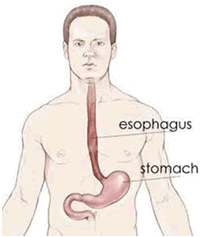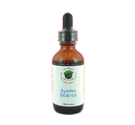|
|
Esophagus Support Remedy
 |
The esophagus is the tube that delivers food from the mouth to the stomach. When swallowing occurs, food is pushed into the top of the esophagus and is then propelled onwards by waves of circular muscle contraction, called peristalsis. If necessary, this process can defeat gravity! Food, and even liquids, can be swallowed while standing on one's head. Muscles encircling the esophagus at the top and bottom provide sphincters that prevent air from being sucked in during inhalation, and regurgitation of stomach contents.
Fun Facts
- The diameter of your esophagus is about the diameter of a quarter.
- The thickness of your esophageal wall is about the width of 3 pennies.
- Muscles contract in waves to move the food down the esophagus.
Health Conditions
- Reflux can cause heartburn, cough or hoarseness, or no symptoms at all. When reflux occurs frequently or is bothersome, it's called gastroesophageal reflux disease (GERD).
- Esophagitis means something is causing inflammation of the esophagus.
- Barrett's esophagus is a disorder in which the lining of the esophagus is damaged by stomach acid and changed to a lining similar to that of the stomach.
- Esophageal Ulcer is an erosion in the lining of the esophagus. This is often caused by chronic reflux.
- Esophageal stricture is a narrowing of the esophagus generally caused by chronic reflux.
- Achalasia is a rare disease in which the lower esophageal sphincter does not relax properly. Difficulty swallowing and regurgitation of food are symptoms.
- Esophageal cancer, although serious, is uncommon.
- Mallory-Weiss tear occurs when vomiting or retching creates a tear in the lining of the esophagus. The esophagus bleeds into the stomach, often followed by vomiting blood.
- Esophageal varices occurs in people with cirrhosis; veins in the esophagus may become engorged and bulge. Called varices, these veins are vulnerable to life-threatening bleeding.
- Esophageal ring (Schatzki's ring) is a common, benign accumulation of tissue in a ring around the low end of the esophagus which may cause no symptoms, except for difficulty swallowing.
- Esophageal web is an accumulation of tissue (similar to an esophageal ring) that occurs in the upper esophagus. Like rings, esophageal webs usually cause no symptoms.
- Plummer-Vinson syndrome is a condition with symptoms that include chronic iron-deficient anemia, esophageal webs, and difficulty swallowing.
Suggestions To Strengthen
- Eat more raw, less cooked foods (118 degrees kills the enzyme action). If raw does not settle well in your stomach, steam your vegetables for three to five minutes. If a person has lots of longitude ridges on the fingernails, chances are they cannot absorb and digest nutrients, so steaming the vegetables is better than eating raw because they are much easier to digest.
- Fruit and cleansing foods are best as the first meal of the day with a hot herbal tea, not coffee.
- Make sure the bowels are evacuating well; which means once per meal eaten.
- A stomach sensitive person should consider food combining until they are better.
- If the issue is chronic, like bleeding or a tear in the esophagus, consider fasting or the Master Cleanse.
|
|
| |
Esophagus Support Remedy
Complete support remedy for Esophagus and related functions
$14.95
Read/Write Reviews
|
 Add
To Cart Add
To Cart |
 |
 |
Stomach Support Remedy
Complete support remedy for Stomach and related functions
$14.95
|
 Add
To Cart Add
To Cart |
 |
 |
Small Intestine Support Remedy
Complete support remedy for Small Intestine and related functions
$14.95
|
 Add
To Cart Add
To Cart |
 |
 |
Large Intestine Support Remedy
Provides support and healing for conditions of the large intestine
$14.95
|
 Add
To Cart Add
To Cart |
 |
 |
|
|

